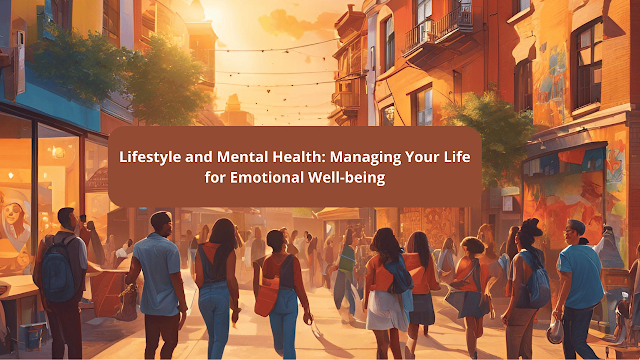Lifestyle and Mental Health: Managing Your Life for Emotional Well-being
In today’s fast-paced world, the concept of "lifestyle" has transcended its traditional definition. It no longer merely refers to daily habits and routines; instead, it encompasses a holistic approach to living—addressing our physical, emotional, and social well-being. Notably, lifestyle plays a critical role in shaping mental health, influencing everything from mood regulation to stress management. This article explores the intricate relationship between lifestyle and mental health, offering practical strategies to optimize both.
The Connection Between Lifestyle and Mental Health
Mental health is not a standalone concept; it is deeply intertwined with various aspects of our daily lives. The following factors illustrate how lifestyle choices impact mental well-being:
1• Physical Activity: Regular exercise is one of the most potent tools for improving mental health. Studies show that physical activity releases endorphins—chemicals that act as natural mood lifters—and reduces symptoms of anxiety and depression. Whether it’s a brisk walk, yoga, or a high-intensity workout, movement encourages better emotional balance.
2• Diet and Nutrition: "You are what you eat" holds true for mental health. Diets rich in whole grains, lean proteins, fruits, vegetables, and omega-3 fatty acids are associated with reduced risks of depression and cognitive decline. Conversely, processed foods high in sugar and trans fats can negatively affect mood and energy levels.
3• Sleep Hygiene: Sleep is the cornerstone of mental health. Poor sleep patterns can exacerbate stress, anxiety, and depression. Maintaining a consistent sleep schedule and creating a relaxing bedtime routine can improve both sleep quality and emotional resilience.
4• Social Connections: Humans are inherently social beings. Building strong, supportive relationships provides emotional stability, reduces feelings of loneliness, and fosters a sense of belonging. Socializing, whether through family gatherings or virtual connections, is vital for mental well-being.
5• Stress Management: Chronic stress can wreak havoc on mental health, leading to conditions such as anxiety and depression. Identifying stressors and employing coping mechanisms like mindfulness, meditation, and time management can mitigate its effects.
Practical Steps for a Balanced Lifestyle
Creating a lifestyle that supports mental health doesn’t require drastic changes. Instead, small, consistent adjustments can lead to significant improvements over time. Below are actionable strategies to enhance your lifestyle:
1• Prioritize Physical Health:
° Engage in at least 150 minutes of moderate exercise weekly.
° Incorporate a variety of nutrient-dense foods into your diet.
° Avoid excessive caffeine and alcohol, as they can disrupt emotional balance.
2• Establish a Routine: A structured daily routine brings a sense of control and predictability, which can alleviate anxiety. Include time for work, leisure, exercise, and relaxation.
3• Practice Mindfulness: Techniques such as meditation, deep breathing, and journaling help ground your thoughts and reduce stress. Dedicate 10-15 minutes daily to mindfulness practices.
4• Limit Screen Time: Excessive use of smartphones and computers can lead to mental fatigue and sleep disturbances. Set boundaries for technology use, especially before bedtime.
5• Seek Professional Support: Don’t hesitate to consult a therapist or counselor if you’re struggling. Professional guidance can provide tailored strategies to manage challenges effectively.

.ico)

